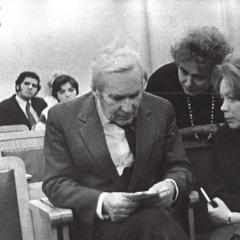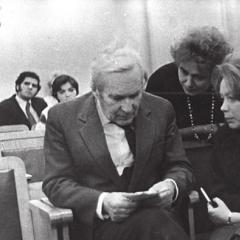Chbmk. Chelyabinsk Basic Medical College. Chelyabinsk Basic Medical College Chelyabinsk Medical School
Admission to the college is carried out on the basis of secondary general (complete) education (after 11th grade).
There is no admission after 9th grade.
The admissions office of the medical college is located in the 2nd academic building of the University (64 Vorovskogo St.)
tel. admissions committee 731-69-13
Medical College of South Ural State medical university is structural unit university at the rank of faculty. Educational programs are implemented at 23 departments of the university by 1 doctor of medical sciences, 22 candidates of medical sciences, as well as full-time teachers with the necessary clinical and pedagogical experience.
Form of study full-time. Training is conducted on budgetary and contractual based on physical and legal persons Tuition payments are made by semester. Nonresident students are provided with a hostel.
On the base secondary general (complete) education Training is provided in the following specialties:
|
02/31/01 General medicine Qualification in-depth training - Paramedic training period - 3 years 10 months |
|
|
02/33/01 Pharmacy Pharmacist training period - 2 years 10 months |
 |
 |
02/31/02 Nursing Basic training qualification Nurse/Nurse Brother training period - 2 years 10 months |
|
02/34/01 Obstetrics Basic training qualification Midwife/Obstetrician training period - 2 years 10 months |
 |
 |
02/31/03 Laboratory diagnostics Basic training qualification Medical laboratory technician training period - 2 years 10 months |
Upon graduation from college is issued state diploma . College graduates are guaranteed employment in medical institutions in Chelyabinsk, which are the clinical bases of the university, as well as in medical institutions Chelyabinsk region.
College graduates can continue their studies at other faculties of the university.
This year, as of June 26, the competition for the specialty “nursing” is based on 9 classes - 2 people per place
According to the admission conditions, the college accepts persons with basic general education (9 grades), secondary general education (11 grades)
Full-time education
Specialty "General Medicine"- qualification Paramedic: training period is 3 years 10 months, training is carried out on a budgetary basis. Admission is made on a competitive basis for mastering secondary education programs general education(11 grades), secondary vocational education, higher professional education (competition of the average score of the educational document).
Number of places - 25, currently 12 applications have been submitted
Specialty "Nursing"- qualification Nurse/Nurse: duration of training is 3 years 10 months, training is carried out on a budgetary and contractual basis. Enrollment is carried out on a competitive basis for mastering basic general education programs (9 grades) (competition of the average score of the educational document).
The number of places in the budget department is 50, 101 applications have been submitted, in the commercial department - 25 places, 42 applications have been submitted.
Specialty "Obstetrics"- qualification Midwife/obstetrician: training period is 3 years 10 months, training is carried out on a budgetary basis. Enrollment is carried out on a competitive basis for mastering basic general education programs (9 grades) (competition of the average score of the educational document).
30 places, 47 applications submitted to date
Specialty "Pharmacy"- qualification Pharmacist: training period 3 years 10 months. Enrollment is carried out on a competitive basis for mastering basic general education programs (9 grades) (competition of the average score of the educational document).
Training is on a commercial basis only. Number of places - 25, 63 applications submitted
Part-time (evening) form of education
Specialty "Nursing" - qualification Nurse/Nurse: duration of training is 3 years 10 months, training is carried out on a budgetary and contractual basis. Enrollment is carried out on a competitive basis for mastering the programs of secondary general education (11 grades), secondary vocational education, higher vocational education (competition of the average score of the educational document).
Documents are accepted by the admissions committee from June 10 to August 25, 2013 at the address Chelyabinsk, Bolnichnaya str., 18. Transport stop - "mn. Grezy" or stop "Kurchatova street".
IN admissions committee The following documents are provided:
Main documents:
Passport and copy of passport;
Passport and a copy of the passport of the legal representative of the applicant under 18 years of age
Original education document (copy);
Marriage certificate if there is a discrepancy in the last name in the passport and education document (copy).
Additional documents: - medical certificate in form No. 086 U;
6 photographs size 3x4;
Vaccination certificate (photocopy);
Medical insurance policy (photocopy);
Pension insurance certificate (SNILS) (photocopy);
Certificate of registration or military ID for young men (photocopy);
A photocopy of the work record book, certified by an OK specialist and the seal of the State Medical University (for applicants to the evening department)
Non-competitive enrollment for orphans and disabled children, as well as children whose parent is a Group I disabled person.
Applicants will be admitted only if they have an original education document.
It all started back in 1934.
In the late 20s - early 30s, the infrastructure of Chelyabinsk changed fundamentally. In a short time it became an industrial giant, and the process of urbanization was rapidly progressing. On the basis of the first city hospital, the development of almost all currently existing specialized medical services began. The developing healthcare structure needed qualified personnel.
By order of the Ministry of Health of the RSFSR, a regional paramedic-midwife school was opened in Chelyabinsk on November 24, 1934, training paramedics, midwives and nurses, which laid the foundation for secondary medical education in the Chelyabinsk region. 9 teachers and 78 students became pioneers on the road of secondary medical education.
A significant contribution to the development of medical education in our region was made by the first directors of the paramedic-midwifery school: Alexander Ivanovich Penkovtsev and Vladimir Mikhailovich Lozhkin.
In 1936, on the basis of the paramedic-midwife school, pharmaceutical and dental schools were additionally opened, and in 1939, the school began training paramedics.
During the pre-war five-year plans, 750 mid-level specialists graduated from the walls of the paramedic-midwifery school.
During the most difficult years for our country, the Great Patriotic War The medical assistant and midwifery school was headed by Grigory Markovich Kleiner.
During war years, the enrollment of students increases, the duration of training is reduced, and classes at the school are held in three shifts. After classes, students go to work in hospitals, medical institutions, evacuation centers, and perform concerts in front of the wounded.
From the memories of graduates of those years: “I had to study in very difficult conditions. The premises were not renovated and were not heated. They wrote on old newspapers and books. There were not enough visual aids. There were not enough teachers, as many went to the front. We studied during the day, and in the evenings and even at night we were on duty at the station, waiting for trains with the wounded, helping to unload them and transport them to hospitals. We managed to do everything: study, be on duty, and visit the wounded with concerts.”
370 people - graduates and teachers - voluntarily went to the front, 147 graduates were awarded military awards.
10 graduates died defending their homeland. Their feat is immeasurable, the names of the heroes will forever remain in our hearts:
D.N. Bogatyrev, B.S. Balandin, V.D. Dylda, A.A. Kamantstseva, T.V. Korabelnikov, F.I. Korotkov, A.A. Nikolaev, V.P. Tonkasov, V.F. Shalgin, I.N. Shkerin.
On May 9, 1984, a memorial plaque was unveiled at the college in memory of graduates who died on the fronts of the Great Patriotic War.
The active development of the healthcare structure occurred during the Great Patriotic War, when evacuation hospitals were deployed in the city, and thousands of local residents and evacuees from front-line areas needed qualified assistance. A whole complex of specialized medical care was created in the city, the development of which continued in the post-war period.
The 50s were a period of industrial and cultural development of Chelyabinsk. Despite the massive military mobilization, the city's population doubled, and the need for medical personnel, provision of quality medical services.
In 1954, by order of the Ministry of Health of the RSFSR, the medical and midwifery school was reorganized into medical School. During these years, the enrollment and graduation of students at the school has increased significantly. The teachers are the most qualified specialists, combining pedagogical activity with medical practice.
Since 1964, the Chelyabinsk Medical School has been headed by Vera Nikolaevna Gaisenko, an outstanding teacher and organizer. Under the leadership of Vera Nikolaevna, the school twice became the winner of the All-Union Socialist Competition, and the team was awarded the Challenge Red Banner.
A new stage in the development of the medical school began in 1976, when Vladimir Timofeevich Shibakov, an excellent student of healthcare in the Russian Federation, an honored teacher of the Russian Federation, assumed the position of director. Under his leadership, a breakthrough was made in shaping the image of the medical school, and a modern fundamental basis for training mid-level medical specialists was laid.
In 1994, Chelyabinsk Medical School by order of the Ministry of Health and Medical Industry Russian Federation reorganized into the Chelyabinsk Medical College, which has the right to train advanced level specialists. By this time, Chelyabinsk had formed an extensive structure of municipal healthcare institutions, which are practical bases for training college students, and mid-level personnel potential, mostly consisting of graduates of the Chelyabinsk Medical College.
In 2004, Chelyabinsk Medical College was renamed State Medical College by order of the Main Directorate of Health Care of the Chelyabinsk Region. educational institution secondary vocational education "Chelyabinsk Basic Medical College".
In November 2010, by decree of the Government of the Chelyabinsk Region, the Argayash Medical School was merged with the Chelyabinsk Basic Medical College. This is a creative team of teachers with enormous potential. Today we are one family, and this is the merit of both the leaders and each member of the team.
The history of the college continues to be written by a new generation. Over the years, the college has developed its own traditions and formed a friendly team of professionals, which has been headed by Marina Aleksandrovna Kopotilova since 2006.
Marina Aleksandrovna is a talented, competent organizer, doctor, manager in vocational education, teacher of the highest qualification category, member of the Board of the Association of Colleges of the Chelyabinsk Region, laureate of the Governor of the Chelyabinsk Region.
In 2014, the Chelyabinsk Basic Medical College became a laureate of the competition “100 Best Colleges of Russia” in the categories: “Best Regional College”, “Best College in the Field of Patriotic Education of Youth”, “Best Socially Oriented College”.
GBOU SPO "Chelyabinsk Basic Medical College" is a laureate of the competition "100 Best Colleges of Russia" in 2009, 2011, 2013, 2014.
The college was awarded the highest national award in the field of science and education - the Order of K.D. Ushinsky "For merits in the field of development of pedagogical sciences."
The college's development strategy is aimed at training competitive specialists focused on working in multidisciplinary medical organizations capable of acting in market conditions.
The college's facilities include four educational and practical buildings. Educational and laboratory rooms equipped at the modern level allow us to achieve high quality professional training for students.
Chelyabinsk Basic Medical College is a state secondary school, known, perhaps, for the most important thing - fidelity to its direction.
This college of Chelyabinsk, also known as ChBMK, is a specialized educational institution that, from the moment of its creation to the present day, specializes exclusively in training specialists in the secondary vocational education program and only in the medical field.
Chelyabinsk Basic Medical College (CHBMC) was founded in 1936 as a paramedic and midwifery school. The educational institution received its current name and status in 1994.
Chelyabinsk Basic Medical College can confidently be classified as a large medical secondary vocational educational institution. The educational institution has more than 70 teachers, and the number of the entire staff of ChBMK exceeds 100 people.
Training is conducted by qualified teachers, many of whom have the appropriate category. During the existence of the educational institution, the college has graduated more than 30 thousand specialists, most of whom connected their lives with the medical field.
At ChBMK College you will not find the specialties of a lawyer, economist or manager. This largely distinguishes the educational institution from other similar colleges in Chelyabinsk. In 2009, the work of the college was celebrated in St. Petersburg, awarding the educational institution a gold medal in the nomination of the hundred best colleges in Russia.
Chelyabinsk Basic Medical College (CHBMK) - specialties after 9th grade
Chelyabinsk Basic Medical College (CHBMK) - specialties after 11th grade
Admission to the Chelyabinsk Basic Medical College (CHBMC) is carried out after 9th or 11th grade. When entering after 9th grade, the period of study may be extended.
also in educational institution department is working additional education, providing advanced training for specialists with secondary vocational education medical education in areas:
Chelyabinsk Basic Medical College (CHBMK) - advanced training
In addition to the departments of secondary vocational education, the ChBMK operates a department of additional education, which provides advanced training for specialists with secondary vocational medical education in the following areas:
| # | Speciality | Areas of study | Training period |
|---|---|---|---|
| 1 | General Medicine | General Medicine | Specialization - 288h Improvement - 216h |
| 2 | Midwifery | Modern aspects of obstetric care in maternity institutions |
Improvement - 216h |
| 3 | Pharmacy | Modern aspects of the work of pharmacists | Improvement - 144h |
| 4 | Nursing | Medical massage Nursing cosmetology Primary health care and preventive care for the population |
Specialization - 288h Specialization - 288h Improvement - 144h |
Admission to ChBMK College for secondary vocational education programs is carried out according to Unified State Exam results. Before entering the Chelyabinsk Basic Medical College, applicants - students of grades 9 and 11, can enroll in training courses which are held annually in this educational institution.



